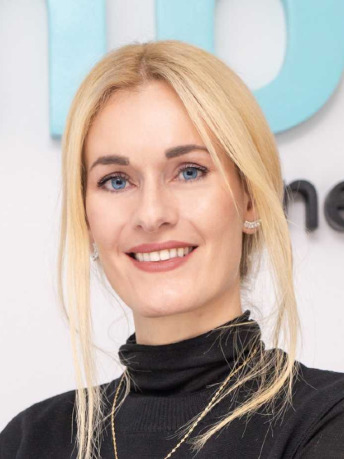Embedding open science in our university’s DNA - Interview with Chief Open Science Ana Ranitovic
The UG Open Science Programme supports the academic community in making the transition to being open in their research and teaching. In this interview, Ana Ranitovic, Chief of Open Science and the programme's manager, shares the key achievements of the first programme phase (2021-2023), and looks ahead to what’s next: How will open science further shape the future of research and education at our university?

The first phase of the Open Science Programme is completed. What role does open science now play at our university? What has been achieved?
The completion of the first phase of the Open Science Programme (OSP) represents a significant milestone for our university, laying essential foundations for a culture of openness in research and education. We are immensely proud of our achievements, which can also be measured in numbers—for example, the near 100% open access publishing rate for journal articles, the funding of 47 open access book projects, the launch of our Open Science Public Engagement Seed Fund, awarded to nine innovative public engagement initiatives.
But these numbers are only part of the story. Equally important is the invisible infrastructure we’ve built, such as pioneering efforts that now enable researchers to generate and share FAIR data, including the development of a guide for FAIR “restricted access” data to navigate confidentiality restrictions. These behind-the-scenes advancements ensure that open science is not just possible but seamless, and they lay the foundation for the next phase of the programme.
What is the focus of the second phase of the Open Science Programme? What do you want to achieve during this second phase?
The second phase of the Open Science Programme represents a new chapter—one that goes beyond stimulating open science to fully embedding it in our university’s DNA. Our focus now is on making open science not only a set of tools or practices but an integral part of how we research, teach, and engage with society.
In this phase, our top priority is large-scale culture change. This means concrete actions: from working to integrate open science into our Rewards & Recognition programme, to developing the necessary policies such as for Open Education, to expanding support for FAIR data through the training of data stewards. We are also fostering new and sustainable models of scholarly communication, like diamond open access, by strengthening the University of Groningen Press (UGP).
We are not doing this alone. The OSP is working closely with the research community, as well as aligning with national and international efforts, ensuring we collaborate and contribute to a broader movement toward open science. We are excited to embrace the challenges thanks to these partnerships and the wholehearted support of our University Board, faculties, as well as University Services, the CIT, and last but certainly not least - the University Library.
We’re not just building a more open university - we’re creating a more impactful institution that leads the way in shaping the future of science, and the UG community can be proud to be part of this transformation.
How will these plans impact the UG community?
The UG community will experience both subtle and profound shifts as open science increasingly becomes embedded in our academic environment. For researchers and educators, much of this transition, such as adopting FAIR data and software standards and Diamond open access, will feel seamless. The goal is for these new practices to be so well-integrated that they become the norm without disruption.
Yet, the broader impact will be unmistakable. Together with the University Board we have set ambitious objectives for this phase, ensuring that open science contributes to digital sovereignty, reduces our reliance on commercial publishers and providers, and promotes large-scale cultural change. As a result, the UG community will hopefully benefit from greater autonomy and independence in how we share knowledge and conduct research.
Students and researchers will also enjoy better access to educational resources, as we reduce costs associated with licensing and subscriptions. Additionally, our efforts in public engagement, such as the creation of a Citizen Science Hub which we are currently preparing a proposal for, will foster deeper connections between our university and society, empowering citizens to engage with and benefit from academic research.
Through these initiatives, we’re not just building a more open university - we’re creating a more impactful institution that leads the way in shaping the future of science, and the UG community can be proud to be part of this transformation.
More news
-
15 September 2025
Successful visit to the UG by Rector of Institut Teknologi Bandung
